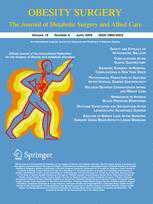一项迄今最大型的基于社区研究的减肥手术后长期转归显示,在接受减肥手术后5年内2型糖尿病(T2DM)获得完全缓解的重度肥胖成人中,超过1/3在首次缓解后5年内2型糖尿病复发,该研究于2012年11月18日在线发表于《肥胖外科学》(Obesity Surgery)。
David E. Arterburn(医学博士,公共卫生硕士,华盛顿州西雅图市群体健康研究所普通内科医师和副研究员)和同事进行了一项回顾性队列研究,该研究纳入4434名T2DM成人患者,他们于1995~2008年在3个综合性医疗保健中心接受了胃旁路术。这3家中心分别是明尼苏达州健康伴侣中心、北加州Kaiser Permanente中心及南加州Kaiser Permanente中心。
超过半数(55.5%)患者接受开腹Roux-en-Y胃旁路术(RYGB),44.5%接受腹腔镜RYGB。然而,这2种方法的缓解率并无显著差异。每年的手术数量从1995~1996年的9例(占手术总数的0.2%)上升至2007~2008年的1227例(占手术总数的27.7%)。
总体上,76.9%(95%可信区间[CI]为75.3%~78.6%)的患者在术后5年内T2DM获得部分缓解,68.2%(95%CI 66.4%~70.0%)在术后5年内获得完全缓解。在T2DM完全缓解的患者中,35.1%(95%CI 32.0%~38.4%)在首次完全缓解后5年内复发。
研究人群女性占77.1%,70.1%的患者在进行手术期间服用口服药物。复发的危险因素包括年龄较大(年龄每增加5岁的校正风险比[HR]1.07,95%CI 1.01~1.14)、HbA1c水平升高(≥6.5%)以及糖尿病病程较长(糖尿病病程每增加1年,HR为1.13,95%CI 1.09~1.17),上述因素的时限均为手术期间。用部分缓解阈值时,复发率更高(40.1%)。手术期间使用胰岛素者(HR为1.91,95%CI 1.48~2.45)和HbA1c水平≥10%者(HR为2.07,95%CI 1.42~3.02)复发的校正风险比尤其高。
校正手术时的年龄、性别、手术进行的年份、手术类型、手术期间的HbA1c、手术期间的糖尿病药物使用情况和糖尿病病程。
“这项研究的结果进一步揭示了术前选择患者以及当外科干预的目标之一是为了获得持久糖尿病缓解时进行咨询的重要性。”研究者们写道。“一直以来,我们发现与术前不用胰岛素的患者相比,使用胰岛素的2型糖尿病患者在减肥手术后得到缓解的可能性较小,复发的可能性较大。”
该研究的局限性包括入组的T2DM患者减肥手术后第1年缓解率显著低于既往发表的缓解率,以及数据不足,无法分析人种/民族或体重变化是否会对结果造成影响。然而,在对病例中有体重数据的T2DM患者进行的亚组分析中,研究者们发现手术期间的患者体重在统计学上对术后糖尿病是否缓解或复发没有影响。
“尽管存在这些局限性,但我们认为,我们的结果对糖尿病治疗有很多重要的临床及科研意义。”作者们写道。“T2DM患者应被告知单纯减肥手术不能可靠地‘治愈’糖尿病。然而,通过RYGB获得的缓解率似乎远高于任何其他行为或药物治疗获得的缓解率。”
“我们的数据表明,减肥手术对糖尿病的持久缓解效应可能在糖尿病病程早期的患者中最强,但是这一结果应通过将来更多的前瞻性、随机对照研究来证实。”他们总结道。

Background
Gastric bypass has profound effects on glycemic control in adults with type 2 diabetes mellitus. The goal of this study was to examine the long-term rates and clinical predictors of diabetes remission and relapse among patients undergoing gastric bypass.
Methods
We conducted a retrospective cohort study of adults with uncontrolled or medication-controlled type 2 diabetes who underwent gastric bypass from 1995 to 2008 in three integrated health care delivery systems in the USA. Remission and relapse events were defined by diabetes medication use and clinical laboratory measures of glycemic control. We identified 4,434 adults with uncontrolled or medication-controlled type 2 diabetes who had gastric bypass.
Results
Overall, 68.2 % (95 % confidence interval [CI], 66 and 70 %) experienced an initial complete diabetes remission within 5 years after surgery. Among these, 35.1 % (95 % CI, 32 and 38 %) redeveloped diabetes within 5 years. The median duration of remission was 8.3 years. Significant predictors of complete remission and relapse were poor preoperative glycemic control, insulin use, and longer diabetes duration. Weight trajectories after surgery were significantly different for never remitters, relapsers, and durable remitters (p=0.03).
Conclusions
Gastric bypass surgery is associated with durable remission of type 2 diabetes in many but not all severely obese diabetic adults, and about one third experience a relapse within 5 years of initial remission. More research is needed to understand the mechanisms of diabetes relapse, the optimal timing of surgery in effecting a durable remission, and the relationship between remission duration and incident microvascular and macrovascular events.
来源:OBES SURG
版权声明:
本网站所有注明“来源:梅斯医学”或“来源:MedSci原创”的文字、图片和音视频资料,版权均属于梅斯医学所有,非经授权,任何媒体、网站或个人不得转载,授权转载时须注明“来源:梅斯医学”。本网所有转载文章系出于传递更多信息之目的,且明确注明来源和作者,不希望被转载的媒体或个人可与我们联系,我们将立即进行删除处理。同时转载内容不代表本站立场。
在此留言
